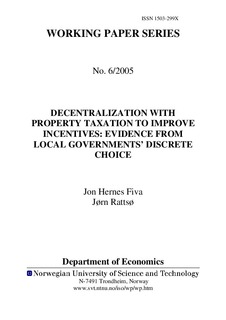| dc.contributor.author | Fiva, Jon Hernes | nb_NO |
| dc.contributor.author | Rattsø, Jørn | nb_NO |
| dc.date.accessioned | 2014-12-19T14:31:48Z | |
| dc.date.available | 2014-12-19T14:31:48Z | |
| dc.date.created | 2006-10-03 | nb_NO |
| dc.date.issued | 2005 | nb_NO |
| dc.identifier | 126068 | nb_NO |
| dc.identifier.uri | http://hdl.handle.net/11250/267101 | |
| dc.description.abstract | Decentralization of government with property tax financing is the standard recipe for public sector reform. Fiscal competition is assumed to stimulate efficiency and hold down the tax level. Property taxation offers additional incentives for efficiency. We study the incentive mechanisms involved using data for decentralized governments and in a setting where they can choose to have property taxation or not. The empirical analysis addresses whether fiscal competition and political control problems influence the choice of having property taxation. The results indicate that both incentive mechanisms are relevant and consequently support the standard advice. Fiscal competition generates a distinct geographic pattern in local taxation and political fragmentation seems to motivate property taxation to control common pool problems. The main methodological challenge handled concerns spatial interaction with discrete choice. | nb_NO |
| dc.language | eng | nb_NO |
| dc.publisher | Institutt for samfunnsøkonomi | nb_NO |
| dc.relation.ispartofseries | Working Paper Series, 1503-299X; 2005:6 | nb_NO |
| dc.title | Decentralization with property taxation to improve incentives: Evidence from local governments’ discrete choice | nb_NO |
| dc.type | Research report | nb_NO |
| dc.contributor.department | Norges teknisk-naturvitenskapelige universitet, Fakultet for samfunnsvitenskap og teknologiledelse, Institutt for samfunnsøkonomi | nb_NO |
